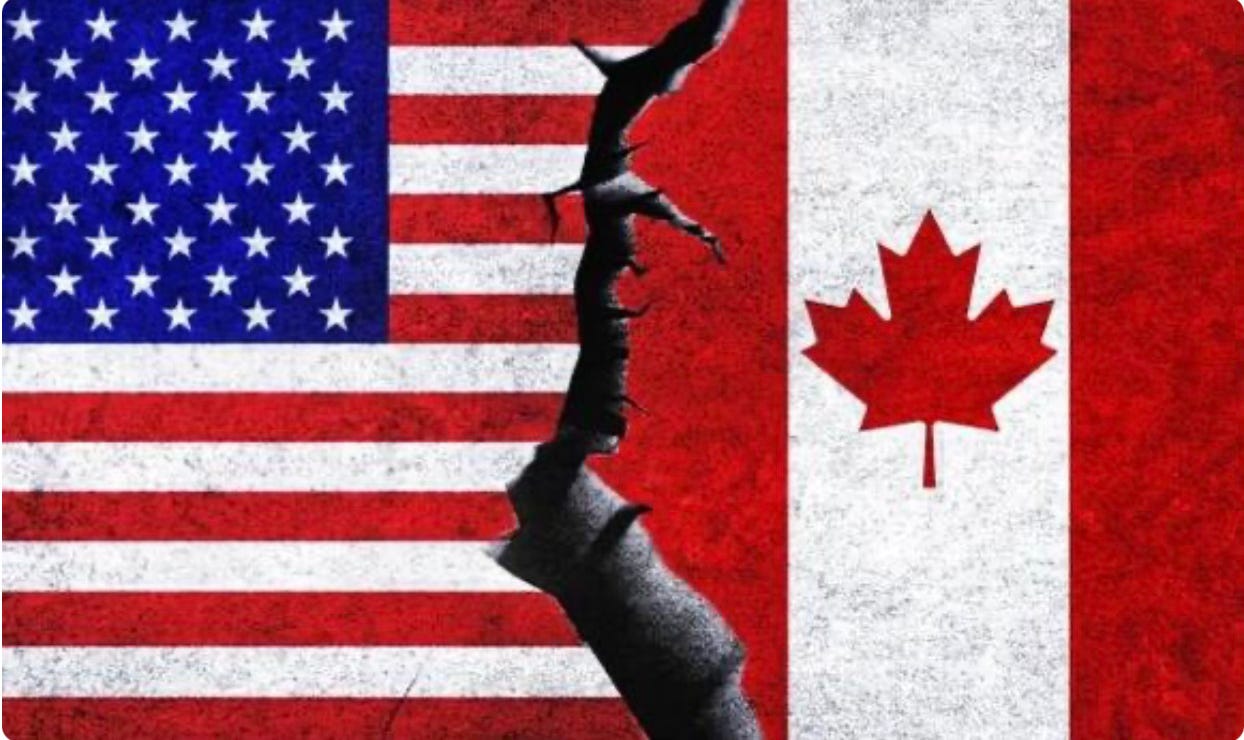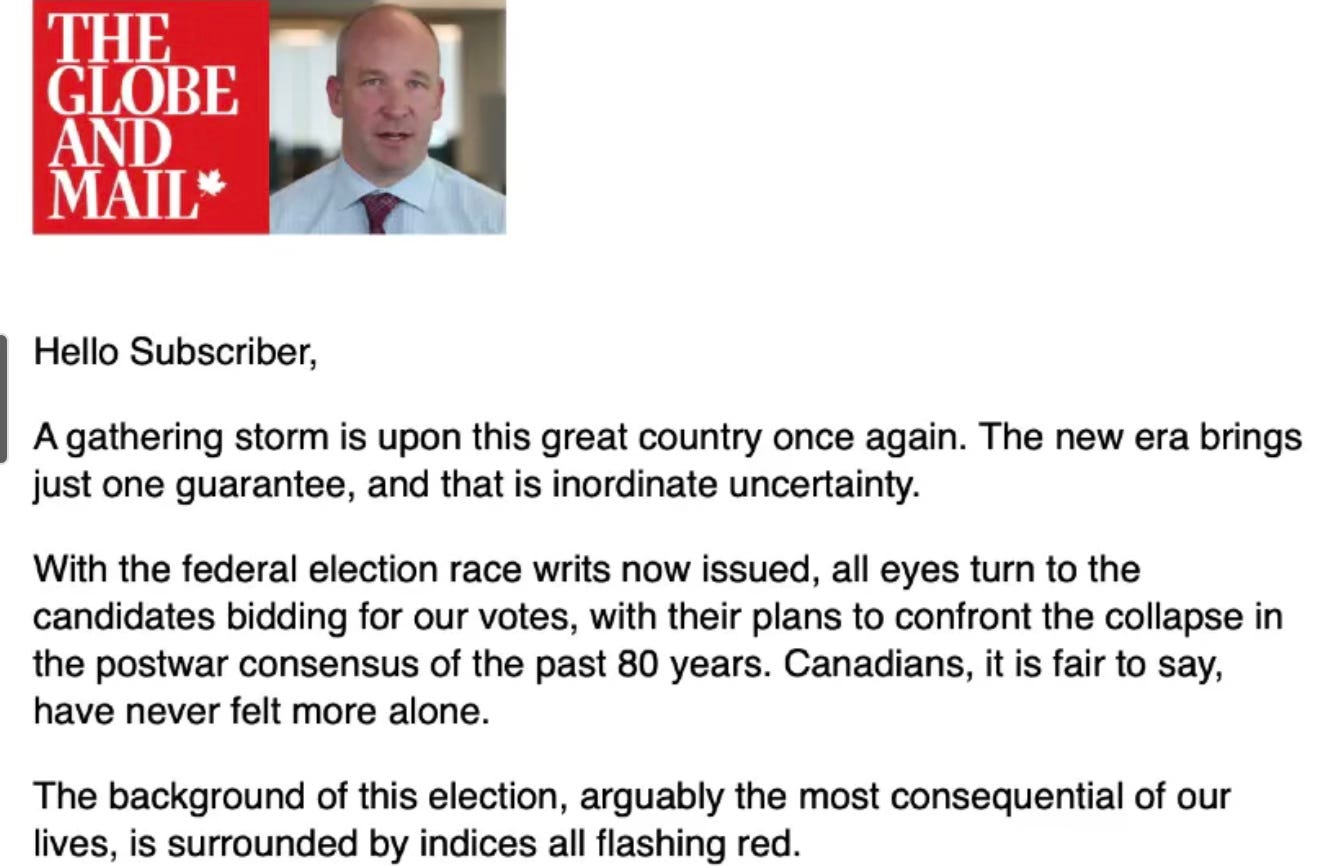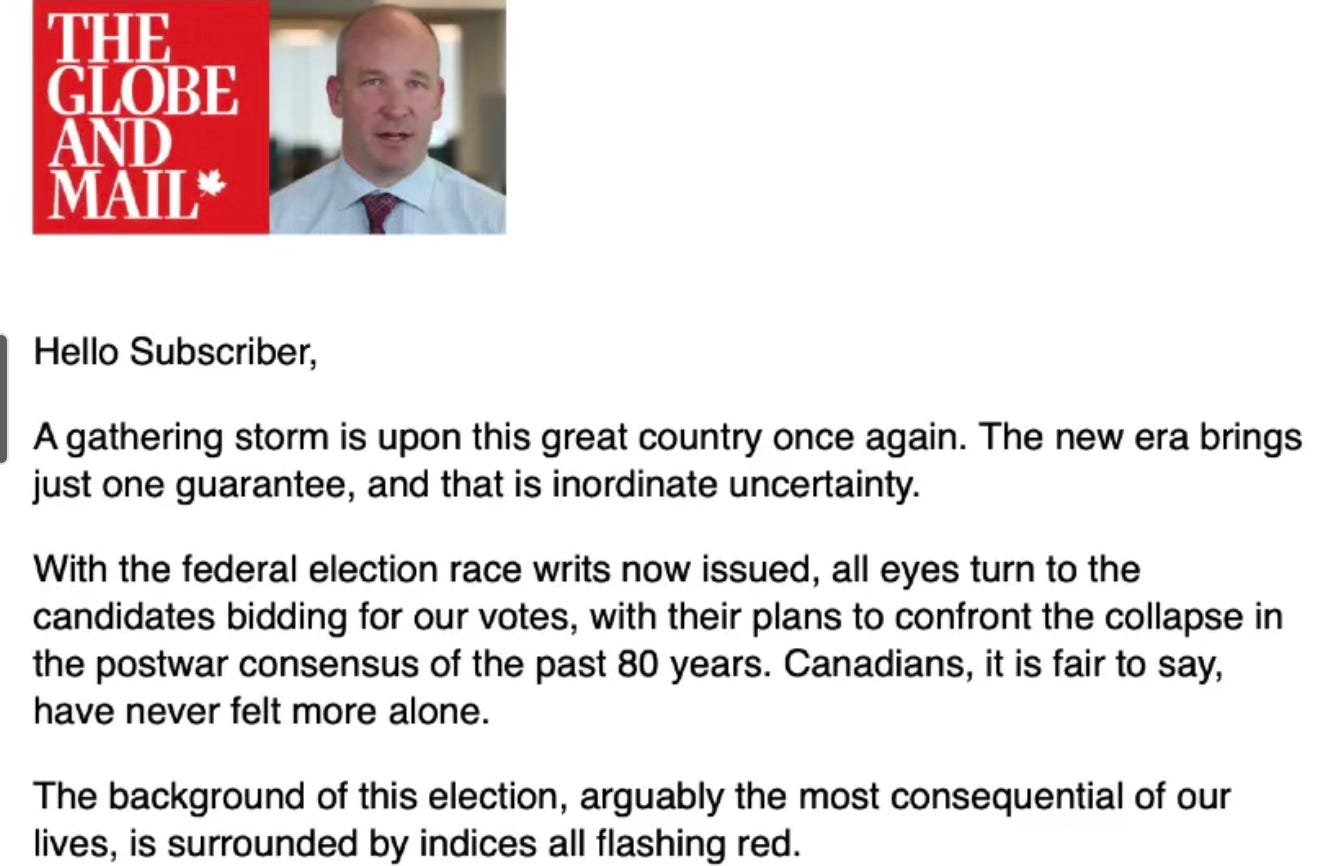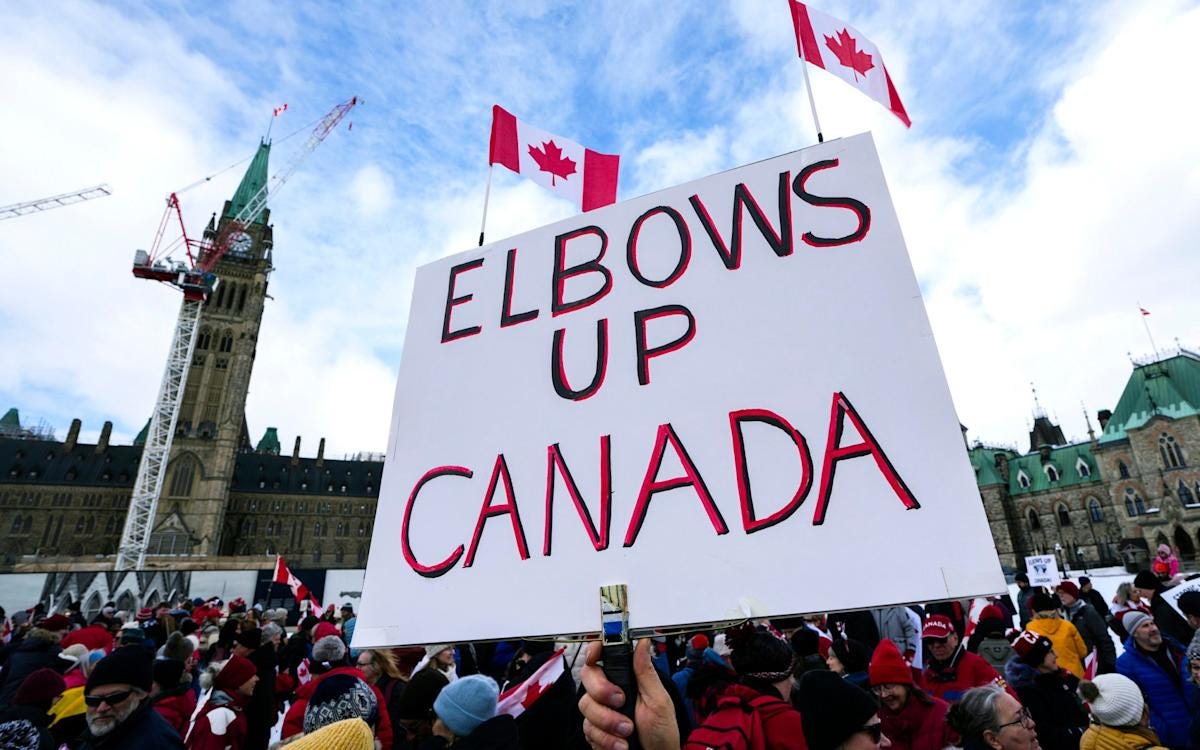Canada on Alert/Canada in allerta
Are They Really Only Words?/Sono davvero solo parole? (il testo in italiano segue quello in inglese)
"So you have millions of gallons of water pouring down from the north with the snow caps and Canada and all pouring down... they have essentially a very large faucet ... all of that water goes aimlessly into the Pacific ... if they turned it back, all of that water would come right down here and right into Los Angeles." –Donald Trump.
On September 18, 2024, standing on the manicured greens of his Los Angeles golf course, then-presidential candidate Donald Trump, as he commented on the California fires and the lack of water to put them under control, made an offhand remark that, at the time, drew little attention.
Fast forward to today, and those words are being revisited against the backdrop of an increasingly aggressive stance toward Canadian sovereignty. Trump's remark has resurfaced in Canadian media, now carrying a far more ominous undertone—yet another piece of evidence of the "existential threat" facing the country, to borrow the words from Foreign Minister Mélanie Joly.
An Ally Turned Adversary
For those outside Canada, it may be hard to grasp the level of unease coursing through the nation. A once steady—if sometimes overbearing—ally is now openly hostile, pursuing its own interests with little concern for Canadian objections. And among the country’s leaders and opinion makers, there is no effort to downplay the threat. Quite the opposite.
Consider, for example, the statements below: a video address from Prime Minister Mark Carney, a letter to subscribers from David Walmsley, Editor-in-Chief of The Globe and Mail (Canada’s leading daily newspaper), and an audio excerpt from an interview on CBC Radio’s The Current with political philosopher James Stanley, author of How Fascism works. Currently at Yale, Stanley will soon be joining the University of Toronto.
Link to the video of Prime Minister Mark Carney.
Transcript: “It is clear the US is no longer a reliable partner. It is possible that with comprehensive negotiations we can re-establish an element of confidence, but there will not be going backwards.
Letter from David Walmsley, editor-in-chief of The Globe and Mail:
Audio excerpt of CBC Radio’s interview with James Stanley
Transcript:
Interviewer: Yesterday the P.M. said – and this has got a lot of attention in the United States and around the world because, again, is a very direct language – that the United States is no longer a reliable partner, and it’s no longer an ally... how should Canada respond, do you think...?
Stanley: I think that was a good solid response, but I’d like to see a much bolder response
Interviewer: Which would include what?
Stanley: The United States in its current form is an enemy of Canada that seeks to... ah, seeks to at least dominate us if not annex us.
The Canadian Response: No Illusions
Each of these stances, in its own way, underscores a central reality: Canada is not assuming goodwill. It is bracing for impact. There is no hand-wringing over whether the Trump administration might take offense at these positions. The approach, borrowed straight from the country’s national sport, is clear: when an opponent plays dirty, you don’t back down—you put your elbows up and meet the challenge head-on. Even when you know you’re the smaller player.
Canada in allerta
Sono davvero solo parole?
"Ci sono tutti quei milioni di galloni d'acqua che scendono da nord, dalle cime innevate e dal Canada... è come se ci fosse un enorme rubinetto... tutta quell'acqua finisce inutilmente nel Pacifico... se la deviassero, arriverebbe direttamente qui, a Los Angeles.” – Donald Trump
Nel settembre 2024, mentre calcava il green ben curato del suo campo da golf a Los Angeles, Donald Trump – all'epoca ancora in corsa per la Casa Bianca, parlando degli incendi in California e della mancanza d’acqua per farvi fronte, fece una dichiarazione che, al momento, passò quasi inosservata.
Oggi, dinanzi all’atteggiamento sempre più assertivo – si potrebbe dire apertamente ostile – del Presidente americano nei confronti della sovranità canadese, quelle parole assumono un sapore diverso. I media canadesi le hanno riprese e rilanciate, interpretandole come un'ulteriore prova di quella che la ministra degli Esteri canadese Mélanie Joly definisce la "minaccia esistenziale" portata al suo Paese.
Da alleato ad avversario
Per un osservatore esterno è difficile comprendere pienamente l'ondata di preoccupazione che sta attraversando il Canada. Un alleato storico, seppur talvolta ingombrante, si è trasformato in un avversario dichiarato, pronto a perseguire i propri interessi incurante delle proteste canadesi. L’ansia cresce e con essa una chiara consapevolezza: il Canada non può affidarsi alla benevolenza statunitense.
Tra i leader e gli opinionisti del paese, nessuno sembra intenzionato a minimizzare la portata della minaccia. Al contrario. Tre recenti prese di posizione lo dimostrano chiaramente:
Il video-messaggio urgente del Primo Ministro del Canada Mark Carney.
Trascrizione: “È chiaro che gli Stati Uniti non sono più un partner affidabile. È possibile che, attraverso negoziati approfonditi, possiamo ristabilire un elemento di fiducia, ma le cose non potranno più tornare come prima.”
L’editoriale allarmato del direttore del Globe and Mail (il principale quotidiano canadese), David Walmsley.
Traduzione: “Cara/o abbonata/o,
Una tempesta incombe ancora una volta su questo grande paese. In questa nuova era c'è solo una certezza, e cioè un'incertezza senza precedenti.
Con l'avvio della campagna elettorale federale, tutti gli occhi sono puntati sui candidati che si contendono i nostri voti, e sui loro piani per far fronte al crollo del sistema postbellico degli ultimi 80 anni. I canadesi, non è esagerato affermarlo, non si sono mai sentiti così soli.
Il contesto di queste elezioni, probabilmente le più cruciali della nostra vita, si presenta con tutti gli indicatori volti al rosso.”
Un’intervista su CBC Radio con il filosofo politico James Stanley, autore di How Fascism Works (Come opera il fascismo). Attualmente a Yale, Stanley ha ora deciso di lasciare il prestigioso ateneo statunitense per spostarsi all’Università di Toronto.
Trascrizione di un estratto dell’intervista:
Intervistatore: Ieri il Primo Ministro ha detto – e questa dichiarazione ha attirato molta attenzione negli Stati Uniti e in tutto il mondo perché, ancora una volta, è un linguaggio molto diretto – che gli Stati Uniti non sono più un partner affidabile e non sono più un alleato… Secondo lei, come dovrebbe rispondere il Canada?
Stanley: Penso che sia stata una risposta solida, ma mi piacerebbe vedere una reazione ancora più decisa.
Intervistatore: Che dovrebbe includere cosa?
Stanley: Che gli Stati Uniti, nella loro attuale forma, sono un nemico del Canada che cerca di… quantomeno cerca di dominarci, se non addirittura di annetterci.
La risposta canadese: niente illusioni
Il punto comune dei tre contributi? Nessuno sta cercando di rassicurare l’opinione pubblica con false speranze. Soprattutto, il Canada non va chiedendosi se l'amministrazione Trump potrebbe eventualmente risentirsi di queste prese di posizione. Tutt’altro, La strategia sembra ispirarsi direttamente all’hockey, lo sport nazionale: quando l’avversario gioca sporco, non si fa un passo indietro; al contrario, si alzano i gomiti (“Elbows up"), ci si prepara allo scontro e si accetta la sfida a viso aperto. Anche quando sai di essere il meno forte.













No doubt the next few years will be challenging, but this might have been the stimulus Canada needed to refine its sense of identity and evolve in some necessary ways.
Thanks, Renato! Challenges often serve as catalysts for growth, and this moment could indeed push Canada to redefine itself. It will be fascinating to see how the country navigates these shifts—hopefully with resilience and a renewed sense of purpose. Thanks for sharing your perspective! 🇨🇦